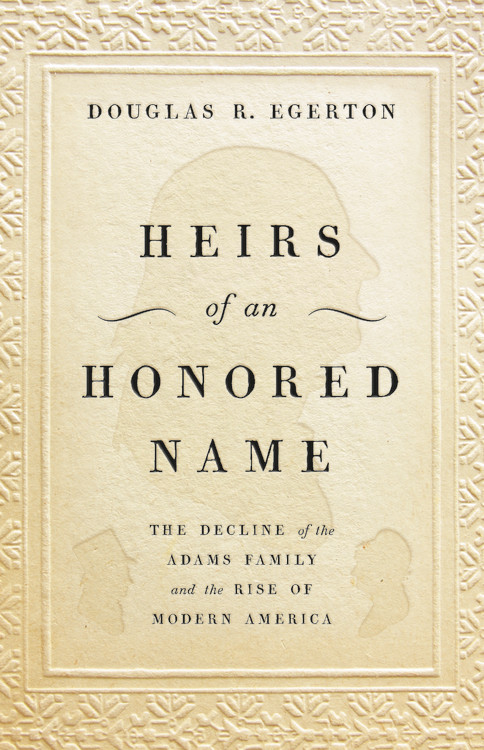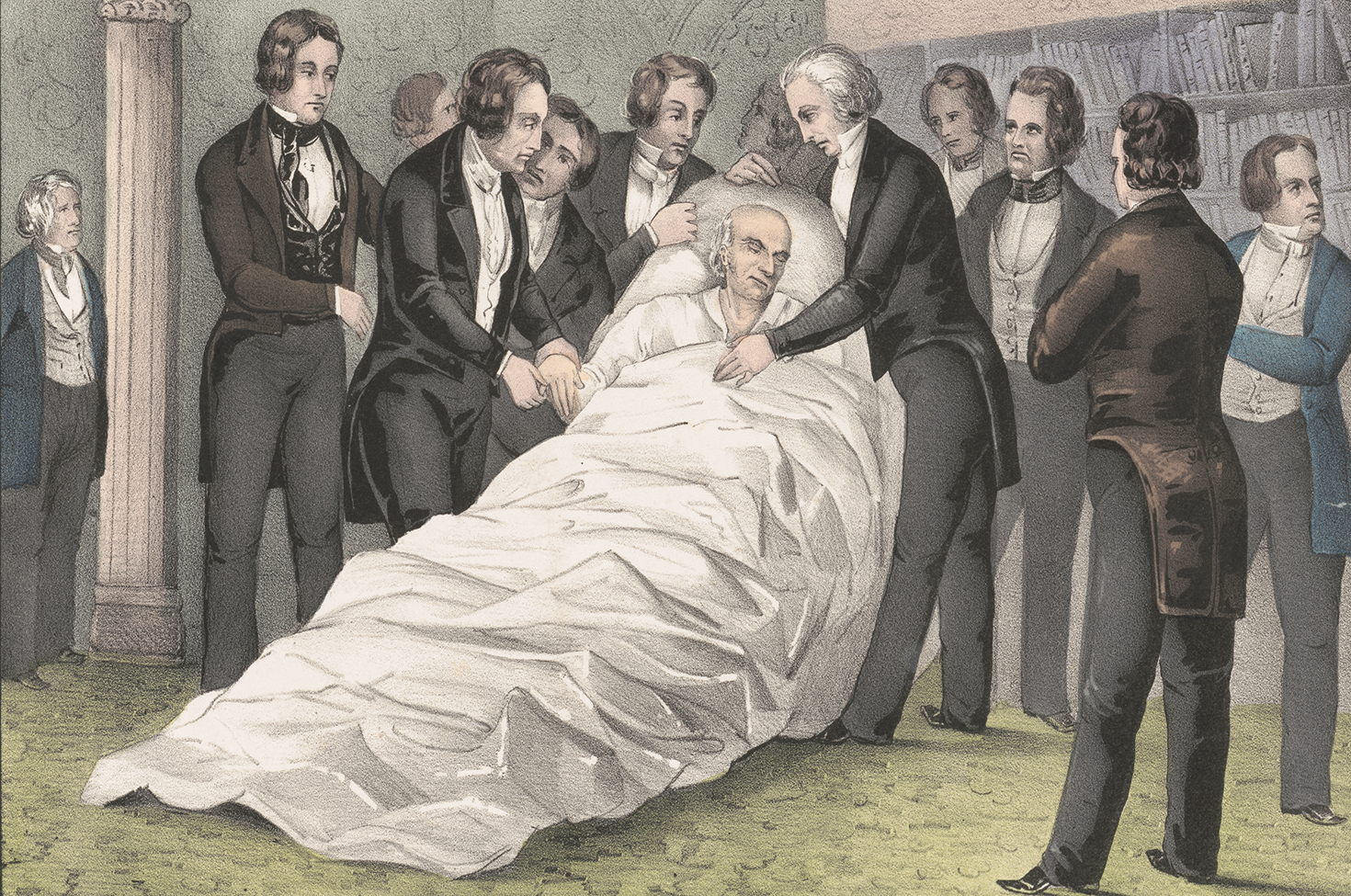
Death of John Quincy Adams at the U.S. Capitol, February 23, 1848, by Currier & Ives. Library of Congress, Prints and Photographs Division.
Henry Brewer Stanton was the first to notice. The United States House of Representatives had just wrapped up debate on a resolution to thank American officers and soldiers for their “splendid victories” in Mexico, and John Quincy Adams, who had long denounced the conflict as a “most unrighteous war,” had cast one of the few nays, voicing his disgust in an “emphatic manner and an unusually loud tone.” Stanton, a reporter for the antislavery Boston Emancipator and Republican and the husband of feminist Elizabeth Cady Stanton, was sitting twenty feet from Adams when he observed the eighty-year-old congressman suddenly make an “effort to rise,” reaching out “with his right hand as if to take his pen from the inkstand.” Adams grew flushed, then paled and clutched the desk with a “convulsive effort” before sinking to the left side of his chair. Congressman David Fisher, an Ohio Whig, caught Adams as he fell, while Congressmen George Fries and Henry Nes, both of whom were physicians, rushed to his aid. “Mr. Adams is dying,” somebody shouted.
Both the House and Senate promptly adjourned, as did the Supreme Court, housed downstairs, but no one left the building. Many crowded in to see whether Adams yet lived. “Stand back! Give him air! Remove him!” Fries bellowed. Adams’ colleagues bore him first to a settee near the door and then into the Rotunda. But the throng followed, so Speaker Robert Winthrop suggested they carry him to the sofa in his private chamber. “Cupping, mustard poultices, and friction have been resorted to,” Stanton reported. “It is probably an apoplectic stroke.” In a few “broken, disjointed, and incoherent words,” Adams mumbled something about his wife, and those in the chamber believed they heard him whisper, “My son, my son.” Most of what he said next was hard to comprehend; some understood him to say, “This is the end of the earth. I am composed.” Others thought him to murmur, “This is the last of the earth. I am content.”
Around two o’clock that afternoon—Monday, February 21, 1848—Louisa Johnson Adams received a message at their F Street home, summoning her to the Capitol. Her husband had appeared in good health that morning and had even walked part of the way to the House, so she little knew what to expect. Her companion, Mary Elizabeth Cutts, accompanied her, and when they arrived at the building, someone assured her that her “poor husband had had a faint turn from which he had recovered.” Even when Louisa saw the throng crowded outside the Speaker’s chamber, she was “altogether unsuspicious of the awful shock” that awaited her. Louisa bent over her husband and spoke his name, but Adams gave no sign of recognition. At length, the attending doctors prevailed on the two women to withdraw.
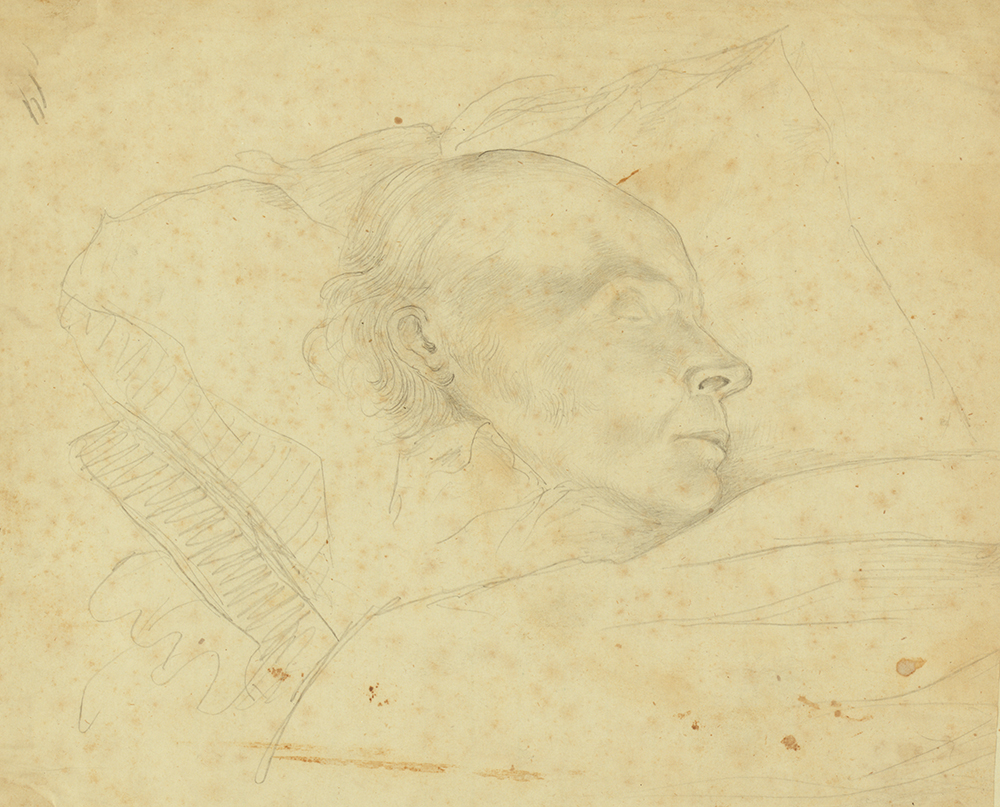
At some point, Adams regained consciousness enough to ask for Henry Clay, his long-ago secretary of state. Although not then a member of the Senate, Clay was in Washington, and he reached the Capitol that evening. By the time Clay arrived, Adams was again unconscious; Clay, one journalist recorded, “grasped the hand of the dying patriot, held it, and wept.”
The next morning, some four hundred miles to the north, Charles Francis Adams Sr., John Quincy’s and Louisa’s only surviving child, stopped by his Boston office at the Daily Whig and spied a telegraph sent by his friend, Congressman John Gorham Palfrey, dated the previous afternoon. “Here was a shock,” Charles Francis scribbled into his diary.
His father “was taken in another fit of paralysis and it was not thought he could survive the day.” Adams dashed home to inform his family and then caught the next train south. “The day was gloomy enough,” Adams mused, and the novel he brought with him, Charlotte Brontë’s Jane Eyre, did little to improve his mood. John Quincy had suffered a small stroke two years before but had quickly regained his health. “He has been the great landmark of my life,” Charles Francis wrote. Although he was now forty-one and had been “accustoming myself to go alone,” the son yet regarded his father as his “stay and companion.” The train initially made good time, but his transfer to a boat heading for the capital made for a “vexatious delay” of four hours. At length, Adams booked a stateroom and tried to sleep.
“Hon. John Quincy Adams is not yet dead,” one Massachusetts newspaper reported on Tuesday, although the editor held out little hope for his recovery: “The pallor of death is upon his face, and he has ceased to struggle with nature.” He died on Wednesday evening without uttering another sound, and the speaker announced his death to the assembled chamber on Thursday.
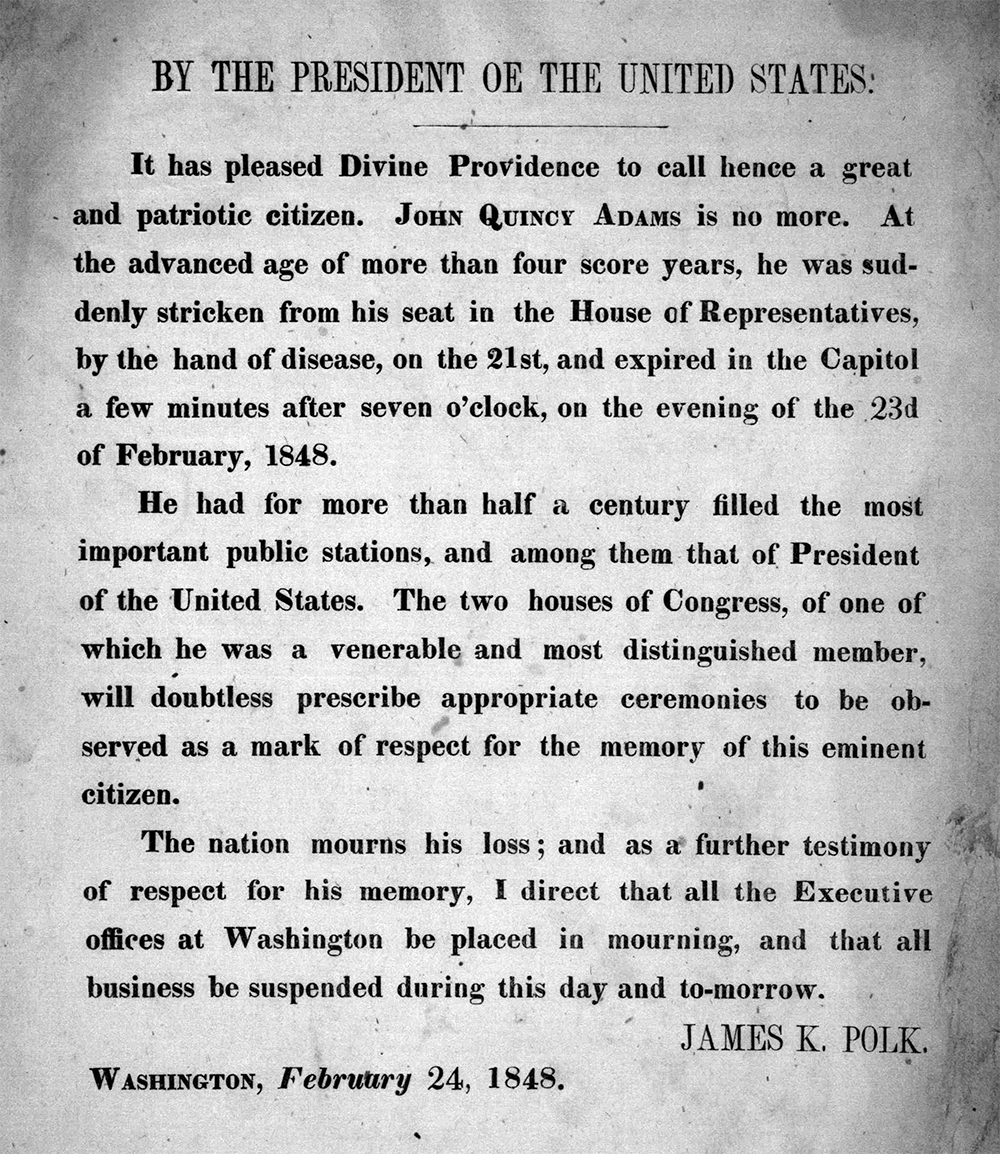
Old John Adams had perished, fittingly, on the Fourth of July, but his son, one journalist marveled, “died in the Capitol itself, and almost upon the birthday of Washington.” It was a “fit end for a career so glorious.” Charles Francis had reached Philadelphia on Wednesday evening and took a room at the Jones Hotel. He awoke on Thursday morning with “the dull, heavy sense of existing pain which comes with calamity.” Seeing a man reading a newspaper with black borders, Adams purchased a copy at the depot but tucked it under his arm until the train was under way.
“I threw open the paper I had bought and the first thing I saw was the announcement that at a quarter past seven last night my father had ceased to breathe,” he confided to his diary. “I have no longer a Father. The glory of the family is departed and I, a solitary and unworthy scion, remain overwhelmed with a sense of my responsibilities.” Charles Francis at last arrived in Washington on February 24. He found his mother calm and preparing for her husband’s funeral. In the meantime, the body rested in the Capitol.
By the time that Charles Francis reached the building, undertakers had placed his father in a lead-lined, partially windowed coffin; a glass plate above the face permitted mourners to view the deceased (a popular feature in an age that feared premature burial). A steady stream of the curious flowed through the room, but Speaker Winthrop—a conservative Whig recently condemned by young Adams and other antislavery activists—emptied the chamber so that Charles Francis might be alone.
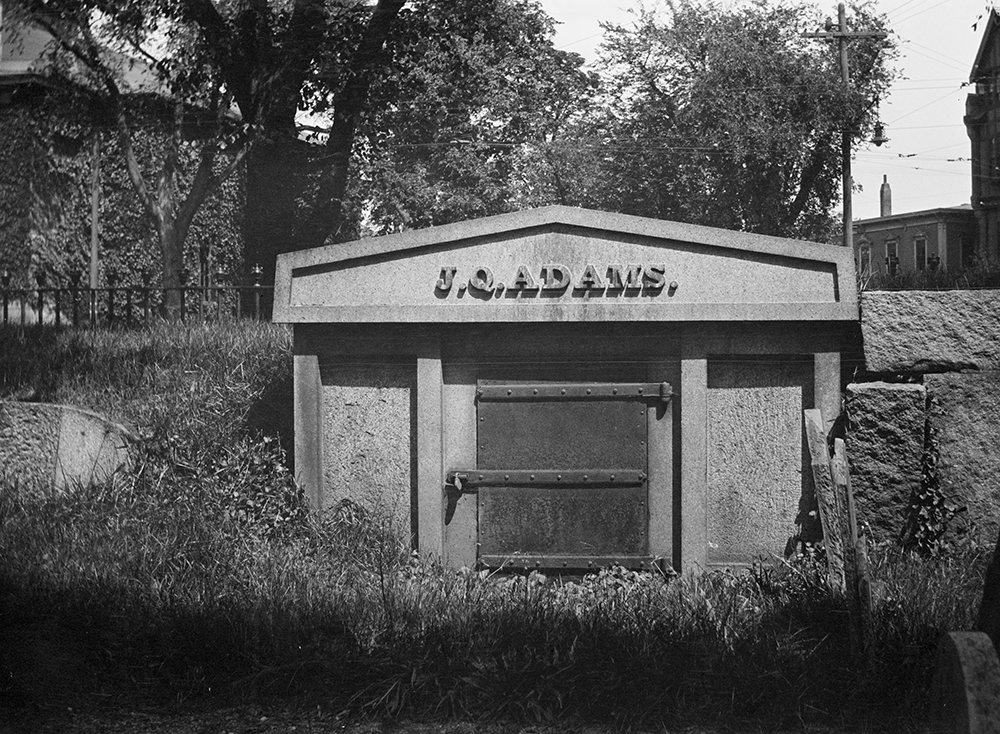
John Quincy’s face, he thought, “was little changed from life,” apart from “some marks of the instruments used to recover animation, which by the way were ridiculous.” For four decades, Charles Francis had looked to his father “for support and aid and encouragement.” Now he “must walk alone and others must lean on” him. Two brothers and a sister had died young, leaving Charles Francis “alone in the generation.” But one deceased brother left behind two children, and Charles Francis had five of his own, with a sixth due in four months. That realization “brought me to a sense of my duty,” Adams wrote that evening in a sentiment his father would have admired. “A tear or two was all,” and then Charles Francis returned to the Committee Room to talk politics.
As Charles Francis prepared to return north with his father’s remains, a lengthy note of sympathy arrived from Henry Clay, who had known John Quincy since their days as peace negotiators in Ghent during the War of 1812. “No surviving friend of your father sympathizes and condoles with you all, with more sincerity and cordiality than I do,” Clay insisted. Predictable hosannas to the former president’s career as “patriotic, bright, and glorious” followed. But then Clay signed off with a comment that surely gave Charles Francis—the son and grandson of presidents—a moment of pause. Since the 1770s, the name Adams had “shone out, with the brightest beams, at home and abroad,” Clay observed. “May its luster, in their descendants, continue undiminished.” Whether Clay meant it as such, that was a daunting challenge.
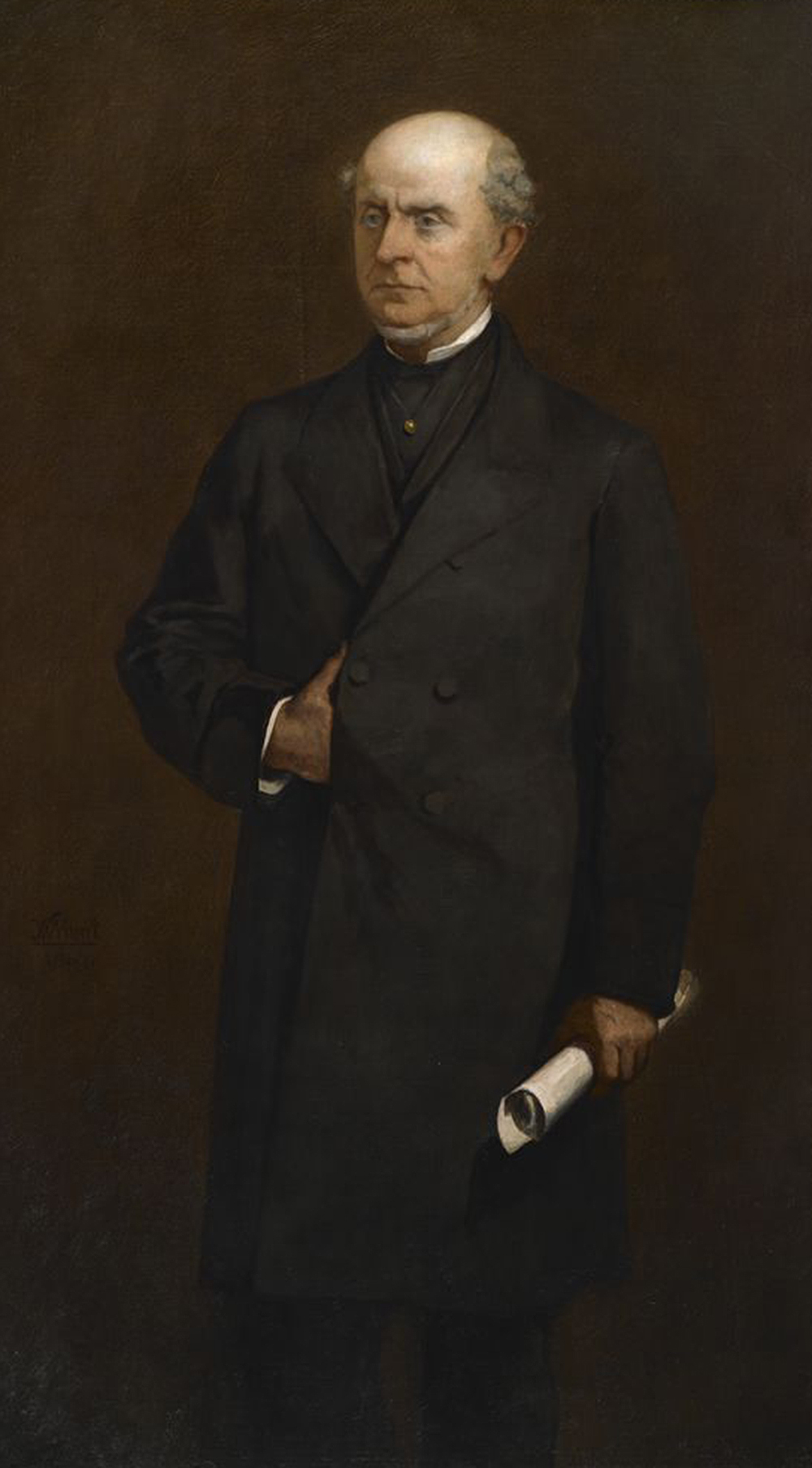
It was also a challenge the son would have to face alone. Each time an American founder died, the nation debated what that loss meant for the present and what that statesman’s legacy held for future generations. One newspaper editor pondered the math. The Constitution had been in effect since 1789, and in that “period of fifty-nine years, we have had eleven presidents.” Eight of that number had “sunk into the tomb; and only one of them (Mr. Adams) leaves a son behind.” Of the three living presidents, both Martin Van Buren and John Tyler (who sired fifteen children by two wives) had living sons. But Charles Francis was unique among the group in that he could claim two of the eleven presidents as his lineage. Later generations would come to regard the Adams family as America’s first political dynasty, but for those trying to take the measure of a man who had literally died within the Capitol’s walls, Charles Francis represented the hopes of what was then American’s only political dynasty.
A decade later, on the eve of his own election to Congress, Charles Francis reflected on the almost crippling burden that this inheritance imposed on his family. “The heir of an honored name, and of men who have distinguished themselves in the most difficult of all careers, has a trying position anywhere, but most of all in America,” he wrote. “Every act of his is contrasted, not with those of common men, but with those of persons whom all have united to produce very extraordinary specimens of the race.” Should he or his sons fail to obtain the status achieved by earlier generations, his countrymen might regard that as a tragic “moral about the degeneracy of families.” But “if by some miracle he should happen to reach a still higher point” than his illustrious ancestors, residents of “all free countries,” Charles Francis worried, could rightly grow concerned about one family’s claim to govern on the grounds of “inherited abilities, or greatness.”
Excerpted from Heirs of an Honored Name: The Decline of the Adams Family and the Rise of Modern America. Copyright © 2019 by Douglas R. Egerton. Available from Basic Books, an imprint of Hachette Book Group, Inc.
